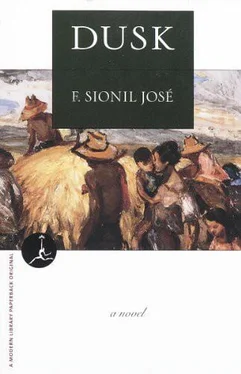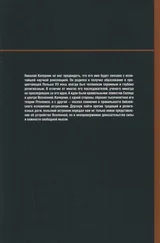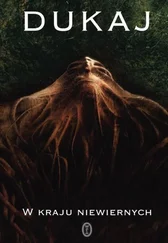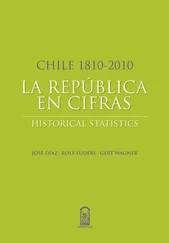“Yes, Apo.” He had emptied his cup and felt invigorated; the coffee was real.
“When I was young”—the Cripple’s face was now dark with gloom—“I had this terrible fever. I was so weak, I could hardly move. It lasted but a few days and when it left, I thought I was finally well, except for my legs. They felt numb. I tried to rise but couldn’t. After I had eaten, I thought I would be stronger. When I finally had sufficient strength, my legs could not support me. I was so surprised and sad — I cried when I fully realized that I had become a cripple. But not here!” He laid a hand on his breast. “And here”—he gestured to his head. “I had medical care, of course, but I think I went to the doctor too late and so I am like this. Which is just as well. You see, the Spaniards found it too much of a bother to imprison a cripple. They thought that I would not be able to do them any harm. They let me live, but my friends — well, they were all shot at the Luneta.”
Istak listened intently. He had heard so many of these stories in the past, he bore witness to what was done to him and his father. Then they took his brother, too, as if his brother’s life were forfeit and his more important, reserved for some design that was not for him to know, just as the Cripple was saved from the firing squad.
“I am happy that you are here with us, Apo,” Istak said.
“But you pity me because I cannot walk,” the Cripple said, his face brightening. “Let me tell you a secret — while these two legs are useless, the third leg is still sturdy but unused!” Istak looked at the thin wasted legs. Yes, it would be a miracle if the Cripple could walk again. Istak grinned; the Cripple was not made of stone; he knew how to laugh. But then, the Cripple suddenly raised his hand and brought it down hard on the table, rattling the silver and the plates. “Oh, that I were not like this, imprisoned in this damaged body. If only I could use my legs!”
The sudden irruption vanished quickly. “It would be a miracle, Eustaquio, if I walked again?”
Istak did not answer. He tried to recall what was in the medical encyclopedia that Padre Jose had in the library and which he often read.
“I am not optimistic anymore. But then—” A scowl came over the Cripple’s face, his eyes suddenly blazed. “ ¡Sin vergüenza! ” he cursed softly. “And do you know what my enemies spread about mc? Those wealthy mestizos who ingratiated themselves with the president? To destroy mc, who exposed their perfidy and stood in their path, they spread the rumor that I had syphilis. Syphilis — it damages not just the body but the brain! No, they did not say it bluntly, to my face and hearing. They insinuated it, hinted at it. In this, I couldn’t confront them, fight them. The people close to mc, they knew it was a lie. That behind this is nothing more than greed and, perhaps, envy. I never aspired to wealth, Eustaquio. So I can look any man in the eye. Remember this, Eustaquio. Remember this.”
Istak had finished the hard-boiled egg, the fried rice from Don Jacinto’s kitchen much tastier than what he had at home; it was fried with pork fat and had bits of onion and garlic.
“I would have peace of mind if I were you, Apo,” Istak said. “Just use less salt.” He leaned forward and pressed the flesh in the Cripple’s forearm. The indentation left by his thumb lingered.
“You have a little edema,” Istak said. “I really think it is your kidneys.”
The Cripple grinned again — the happiness spreading across his pinched, pallid face. It was the first time Istak had seen him so pleased, the melancholy eyes dancing with laughter.
“What else can you do, Eustaquio? You speak Spanish, Latin — both very well. And you are a healer like no herbolario I have ever seen. What are you really or what do you want to be?”
“I am a poor farmer, Apo,” Istak said.
“No, you are not just a farmer,” the Cripple said. “In the past, surely, you must have wanted to be something else.”
So it was; Cabugaw again, the old church, the stone belfry and the bats that roosted in the eaves, the booming clap of bells in his ears and old Padre Jose telling him to read as much as he could, for the world was open only to those who could read and this skill was the most precious gift that any teacher could give.
“I had a teacher, Apo,” Istak said with a touch of sadness. “I wanted to be a priest, to be like him, knowing so much and imparting it all to others.”
“And why did you not become one?”
Istak turned away. “I am an Indio, Apo,” he said simply.
The Cripple leaned forward, his eyes ablaze. “You can still be one if you want to, Eustaquio. Bishop Aglipay has founded the Filipino Church. It is very strong and it is all ours. No Spanish friars ordering us. And we are not subservient to Rome. We must build this church not only because it is ours but because we must have a continuing faith in God. My mother wanted me to be a priest, too. So you are not really alone.
“Do you really believe in God?” the Cripple asked after some silence. “This was a belief you got from the Spaniards, no matter how kindly they may have looked upon you.”
For some time, Istak could not speak, although it would have been so easy to affirm his faith. He had prayed as a matter of habit when he ministered to the sick, a prayer which those who were healed thought had curative powers in itself. He had not tried to correct the impression, for who really knew what prayer could do? There was this power he held, power which was not really his but Someone else’s. Yet, there were times when he doubted the existence of a just and merciful God, and now that it was put to him bluntly, now that he must open up his own mind to himself, he realized with some sorrow and apprehension that his belief was not as steadfast as it once had been and that if given the chance he would not now want to be a priest. Was it all Dalin’s doing?
“I do what I think is right, Apo,” Istak said.
“You are not answering my question.”
“I doubt, Apo,” he said quickly. “And I am ashamed that I do.”
“No, no, Eustaquio!” The Cripple shook his head emphatically. “You doubt, you think — have you forgotten the old injunction? What did the Spaniards say about us? That we are children, without minds, that we can easily be led. This is what the Americans are saying, too. This is what they are telling the world. That we cannot manage our affairs, that we do not deserve to be free. A nation which has people who can think, that nation already has strength. It is the mind which rules, Eustaquio — not instinct or habit.”
Long after they had parted, the Cripple’s words burned in Istak’s mind. In their next encounter, he would have more reasoned-out replies not only to his inquisitor but — he now realized — to himself. He went to his bangcag , the life-giving well, to the guardian of the earth, to draw from them the knowledge that seemed to have ebbed. It had pleased him, of course, to use Spanish, and a bit of Latin again, to argue in a language that was not his and find that desuetude had not dulled his mind, that he could still express himself fully in it, although, at times, the words shaped slowly. He brought to mind how he once told Padre Jose that he was tormented by doubts and the old priest had tweaked his ears, reminding him that there are questions of faith which have no answers, for the ways of God are immutable and imponderable. Istak had believed; he had wakened in the mornings, smelling real coffee brewing in the kitchen. He had lingered, too, at the belfry when he tolled the Angelus and from that pinnacle, watched the west burn with the dying day, the whole rim of the world ablaze with dazzling reds that turned to purples, voluptuous forms or ogre shapes obscured with the onrushing night. Only God could paint these.
Читать дальше












